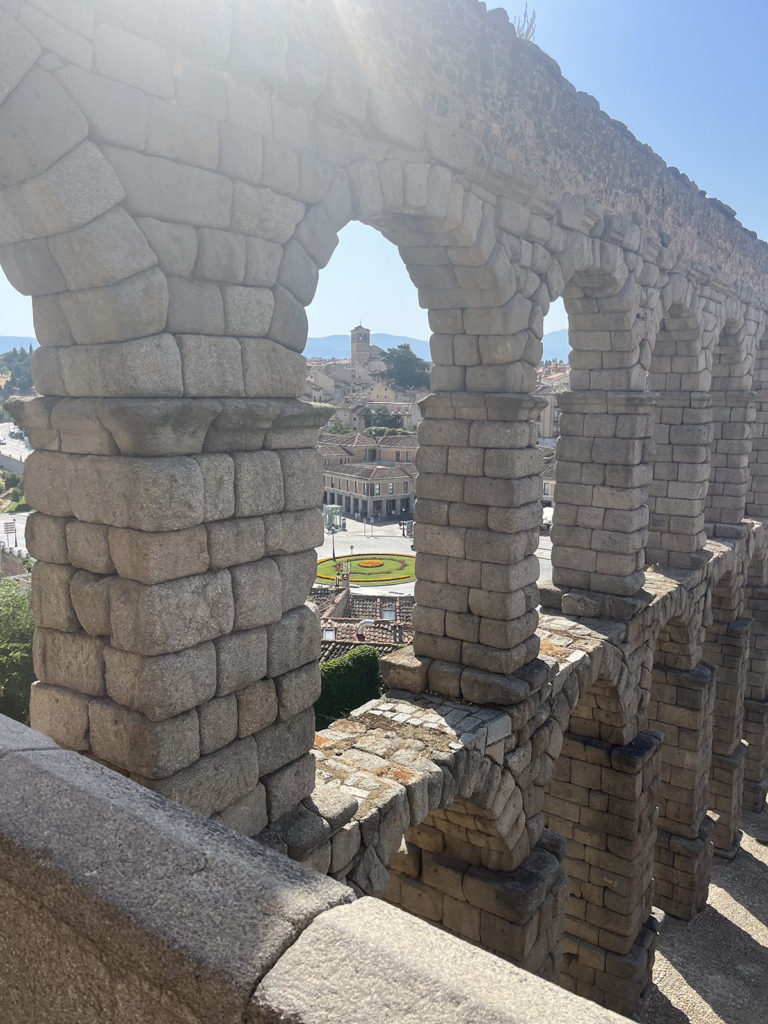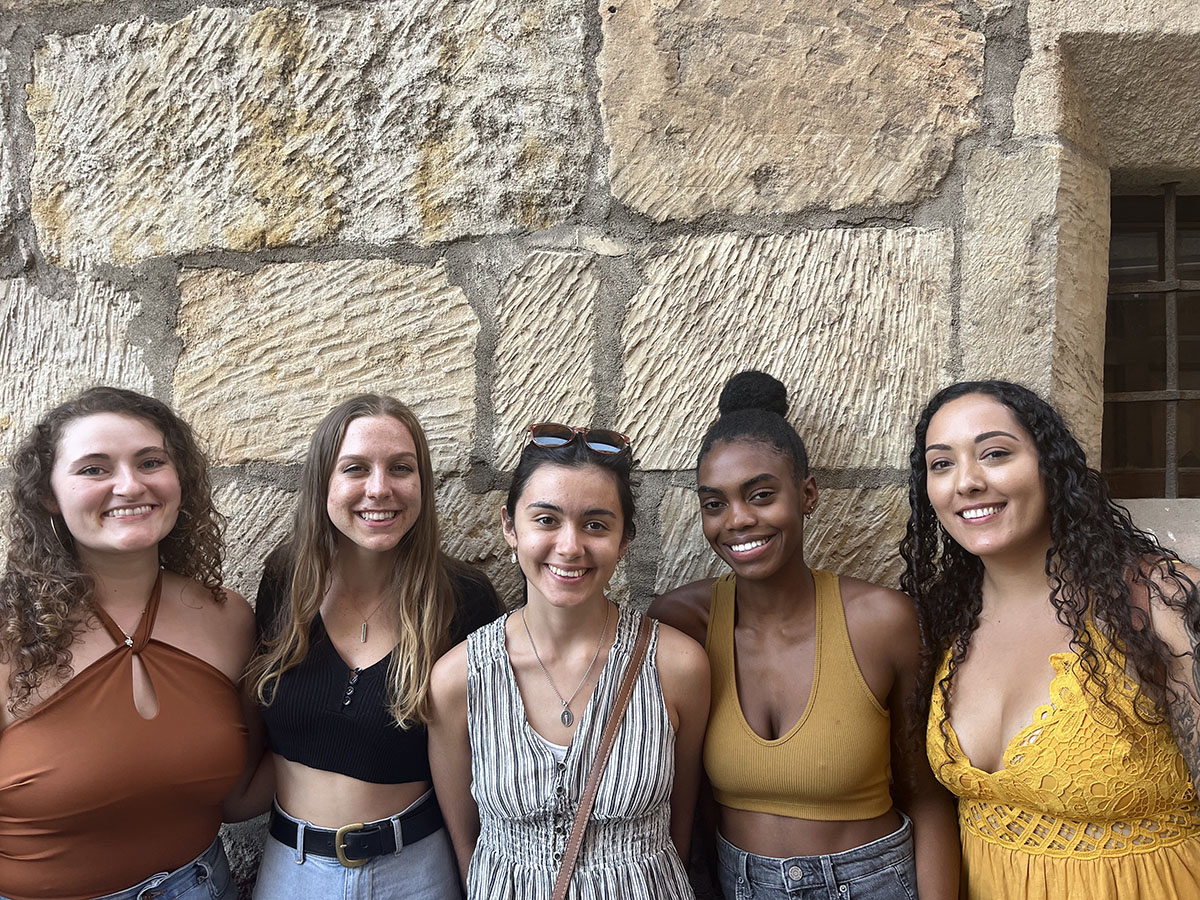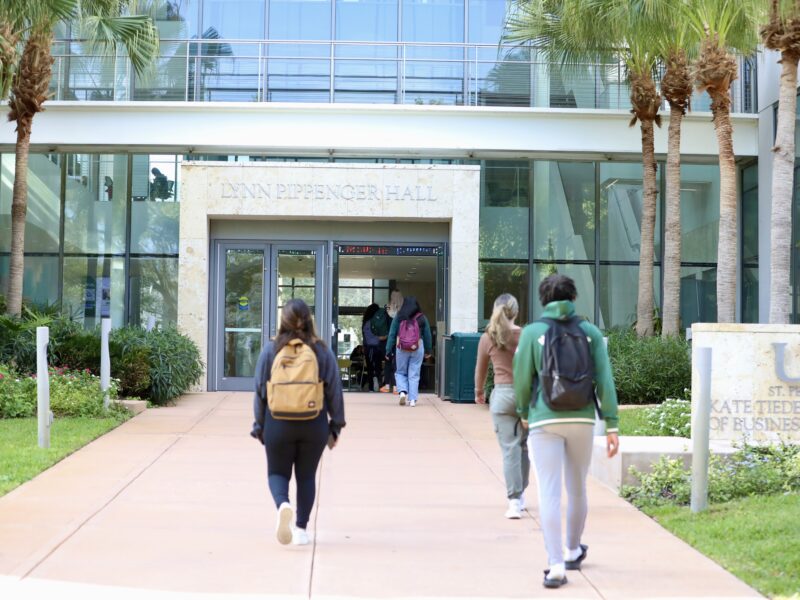(From left to right) Alanna Bland, Kerri Davis, Mary Rocha, Ariel Wallace and Rebecca Dunn are some of the students who participated in the summer study abroad program in Spain.
Courtesy of Rianna McDonald | The Crow’s Nest
After years of hiatus due to the pandemic, the anticipated study abroad program has returned to the University of South Florida.
This summer, 12 USF students from all campuses and majors went to Salamanca, Spain from July 2 through July 31.
Of the various study abroad programs that USF offers; this group of students decided that Salamanca was the right place for them due to their love of the Spanish language.
Salamanca is home to the world’s third oldest university, the University of Salamanca, and the historic city hosts many international students every year, including USF.
This specific study abroad program catered to fulfilling language requirements and additional cultural credits. Each student had their own expectations and experiences during the trip.

Why did you choose this particular study abroad program to Salamanca, Spain over the other options?
Mary Rocha, a sophomore nursing major, said, “I wanted to learn more Spanish through an immersive experience and this trip was recommended in my Spanish III class.”
Kerri Davis, a senior behavioral health major and Spanish minor, said, “I chose this program because I’ve always wanted to study abroad and I’ve always wanted to go to Spain. I figured I may as well combine those two wishes.”
How would you describe the application process? Was the USF or Spain requirements difficult for you to meet?
Ariel Wallace, a senior biomedical science major, said, “The application process was simple, but the financial aid process was not. The timeline of the processes did not align with each other, so it was difficult.”
What would you say was the trickiest part of the process?
“The requirements for Spain, particularly the COVID-19 requirements,” Rebecca Dunn, a senior international studies major said. “Mostly because you had to fill out part of the form and then fill out the rest three days out before the trip.”
“It seemed unfair to have to apply for and commit to a program before even having the opportunity to seek or secure financial aid for it,” Wallace said. “Then, we did not hear decisions about our aid until months after our program commitment, and then suffered for another few months trying to actually secure those funds because USF kept trying to reduce them.”
Was it easy to find the agreed-upon rally point once you landed in Madrid? What, if anything, can be improved about the first group meeting at the airport?
“My plane was the first to land so we had plenty of time to find the meetup spot, but I wouldn’t say it was easy because the Madrid airport is confusing. We had to take a subway to one terminal and then a bus to another and had to stop to ask directions along the way,” Davis said.
“Yes, it was easy for me because I was with the professor and several other students,” Rocha said. “It would have been better if everyone was on the same flight so that we didn’t have to wait for all the students to arrive and get their luggage.”
“I think a bus driver should pick up the students in the area where their flights came in from and that is because Madrid’s airport is difficult to navigate,” Dunn said.
Was this your first time living with a host family? How was it?
“Other than living with other family members abroad, yes,” Rocha said. “There were good aspects as well as bad ones. The language barrier challenges me to communicate more, but also is difficult when I need to convey something important and I’m misunderstood.”
“This was my first time living with a host family and there are pros and cons,” Dunn said. “You get to experience what it’s like to live in Spain, and have someone cook all your meals, but at the same time, you must share a small room with another student and lose your privacy.”
What was your favorite sight/experience/dish?
“I loved visiting La Alberca. It was very beautiful,” Dunn said. “I loved our Saturday excursions even if it can get really hot. I loved walking around Salamanca and just admiring the beauty of the buildings, history and people. I really loved the patatas bravas and the pastries they have there.”
“Definitely walking through Peña de Francia and also the garden we saw in Salamanca,” Wallace said.
What was the most surprising fact you learned about Salamanca or Spaniards?
“The most surprising fact about Spaniards is that [they] do not normally drink water with ice,” said Dunn. “How crazy, especially during summer. It took me a while before I could find out how to make ice cubes. I was also very surprised that they use water bottles so much. Even at restaurants.”
What do you appreciate most in comparison to Salamanca/Spain and your campus/United States?
“Although many people had to adjust to walking, I find it admirable that everyone you could possibly need is within walking distance,” Wallace said. “It feels good to not have to worry about gas or traffic, and also knowing that there might be a healthier environmental impact from the rarity of cars.”
“I appreciate that people in Spain spend time outside and appreciate meeting with their friends and family,” Rocha said. “In the United States, people can be too ‘busy’ with work and other obligations to spend time with their loved ones. Also in Salamanca, everything is within walking distance, but many activities in the United States require some form of transportation like a car or bus.”
“I loved being in a place with such rich culture and history — it’s crazy to be going into buildings that have lasted for so many centuries and thinking about all the people who walked there before you,” Davis said. “I never feel that kind of historical awe or “ancient power” in the United States.”
If you are a USF student interested in applying for a study abroad program, you can contact the USF Study Abroad Office at (813) 974-4314 or navigate the website at https://www.usf.edu/world/education-abroad/.
Rianna McDonald is a senior digital communications and multimedia journalism major at the St. Petersburg campus.




What a great experience! Europe has super strict COVID-19 policies so I’m sure that must have been a big hurdle to the experience.